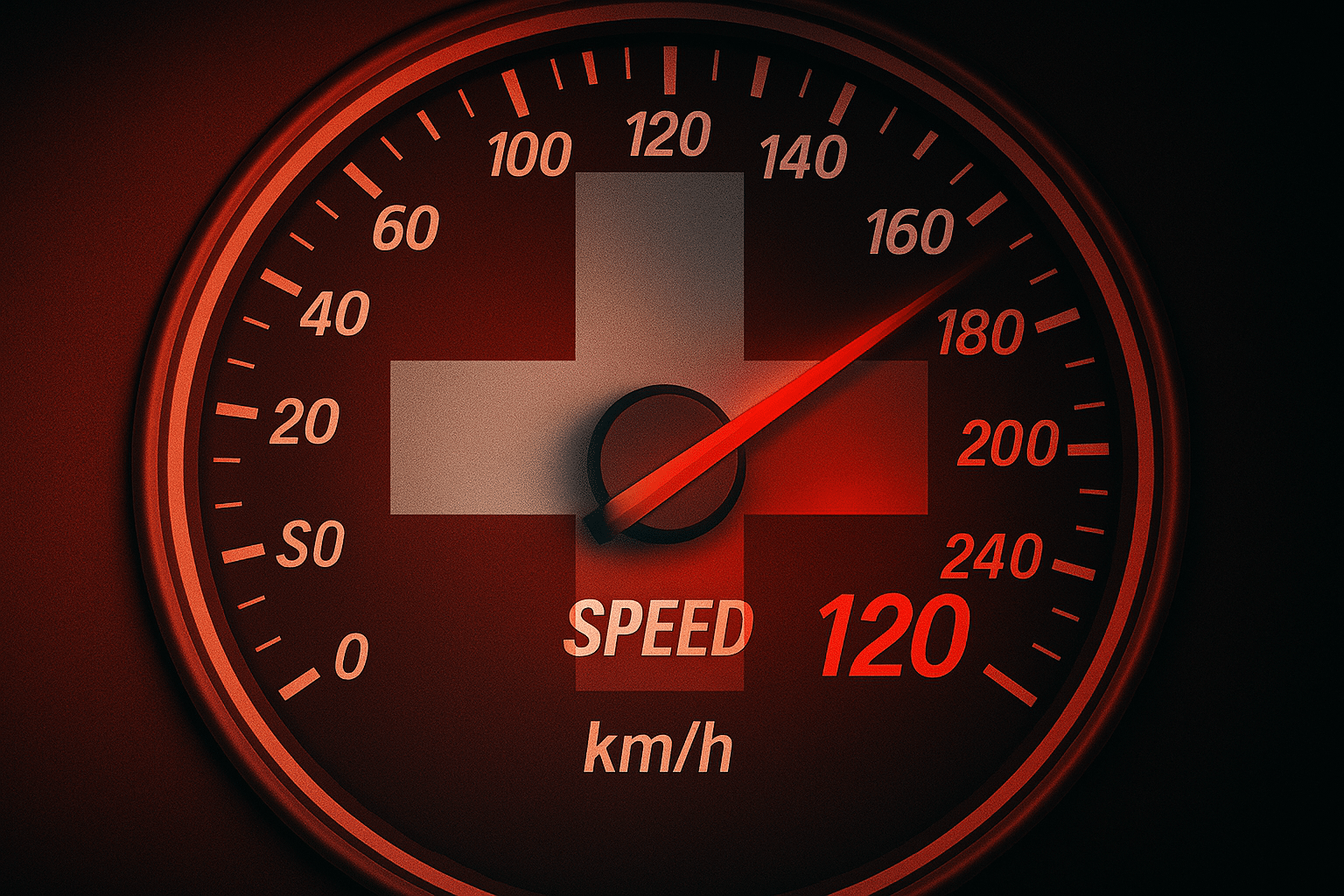Switzerland’s Day-Fine System: $110,000 Penalty for Speeding Explained
Switzerland speeding laws made headlines after a wealthy driver received a fine so large it could buy a luxury car itself. Getting a speeding ticket is never pleasant, but imagine one so large it could buy a luxury car itself. That’s what happened in Switzerland, where a wealthy driver is facing a fine of 90,000 Swiss francs (about $110,000 USD) for driving just 17 miles per hour over the speed limit. The eye-popping penalty has garnered international attention, but in Switzerland, such hefty fines are not a mistake – they’re by design. The Alpine nation is known for Switzerland speeding laws and its unique system of traffic fines scaled to an offender’s income, and this case is a prime example of how it works.
Switzerland Speeding Laws: The Incident
The driver, who hasn’t been publicly named, was caught speeding in the city of Lausanne in western Switzerland. He was driving 77 km/h (48 mph) on a road with a 50 km/h (31 mph) speed limit – a 27 km/h overage. Normally, such a speed infraction might be met with a moderate fine in many countries. But local authorities soon discovered that this wasn’t an ordinary speeder: he happened to be one of the richest people in Switzerland, with a personal fortune in the hundreds of millions of dollars. On top of that, he was a repeat offender, having had a similar speeding incident about eight years prior.
Under Switzerland speeding laws, certain traffic violations are punished with what’s called a “day-fine” system. Essentially, the fine is calculated based on the offender’s daily income and the severity of the offense. The idea is that a fine should sting equally for everyone – so a millionaire and a middle-income person would feel the punishment proportionately. In this case, a quick-thinking prosecutor determined that given the man’s wealth, the maximum fine for his offense would be 90,000 CHF. A local court confirmed the fine, ordering the driver to pay 10,000 CHF upfront and stipulating that the remaining 80,000 CHF would become payable if he committed another infraction within the next three years. It’s a bit like putting his enormous wealth on notice: one more strike, and the full weight hits.
Why Switzerland Speeding Laws Are So High: The Day-Fine Logic
The logic behind Switzerland speeding laws and their steep fines is rooted in fairness and deterrence For someone of ordinary means, a fine of a few hundred francs might be a serious financial setback and thus a deterrent against speeding. But for a multi-millionaire, a $300 ticket is inconsequential – akin to a parking meter fee. By linking fines to income, countries like Switzerland (and others such as Finland, Sweden, and Austria) aim to ensure that punishment for speeding or other offenses isn’t too lenient on the rich or too harsh on the poor. In fact, this case isn’t even the record in Switzerland. Back in 2010, a Swiss court fined a wealthy Ferrari driver the equivalent of about $290,000 after he was caught going over 100 mph, noting his significant net worth when calculating the penalty. That stands as one of the most expensive speeding tickets ever and is frequently cited when discussing Switzerland speeding laws worldwide.
“For us, it doesn’t matter if you’re rich or poor – if you break the rules, you pay your fair share.” — Swiss official comment referenced in media coverage
The Swiss public generally supports Switzerland speeding laws, seeing them as an effective way to enforce traffic laws uniformly. A spokesperson for the Vaud canton (the region where Lausanne is located) explained that under the law, they consider the “personal and economic situation of the offender.” This includes income, assets, and family obligations. Interestingly, if someone is destitute and can’t pay a fine, Swiss courts have the option to substitute jail time instead. In the case of the ultra-rich speeder, jail wasn’t on the table – after all, he can afford the fine – but the massive monetary hit serves as the intended punishment, reinforcing public trust in Switzerland speeding laws as a fair system.

Reaction and Impact of Switzerland Speeding Laws
News of the $110,000 speeding fine has drawn a mix of astonishment and admiration on social media. Many commenters from countries like the United States and UK, where traffic fines are flat amounts, expressed surprise that a fine could reach those heights. Some applauded the Swiss system, suggesting that it truly holds everyone accountable equally under the law. They pointed out that for the wealthy, points on a license or small fines aren’t much of a deterrent, whereas a fine calibrated to their income ensures they think twice. A popular comment online read, “If you can afford a Lamborghini, you can afford a $100k ticket – and maybe that’ll make you drive it carefully!” Critics, however, argue that such fines seem excessively punitive and question whether they verge into the territory of envy or penalizing success. But those critics are relatively few; even in the case at hand, the driver accepted the court’s decision without contesting it, a case often highlighted as proof of how Switzerland speeding laws apply equally to all.
Authorities emphasize that Switzerland speeding laws are not about raking in money from rich speeders, but about increasing road safety. Speeding remains a leading cause of serious accidents. By making the consequences memorable for all drivers, regardless of wealth, Switzerland hopes to keep its roads safer. And it’s not just Switzerland – the concept of income-based fines (called “progressive fines” or “day fines”) exists in several European countries. For example, Finland made headlines years ago when it fined a Nokia executive 116,000 euros for speeding on a motorcycle, based on his high income.
A Note for Travelers
For travelers or foreigners, Switzerland speeding laws are also a cautionary tale. If you rent a car there (or anywhere with similar laws) and think about speeding, remember that any fines will follow the local system. While a tourist likely wouldn’t be earning income in Switzerland to calculate a day-fine, serious speeding can even lead to on-the-spot fines or vehicle impoundment. In short, Switzerland speeding laws mean business.
In the end, this wealthy individual’s wallet took a significant hit, but he kept his luxury car and, importantly, learned a very expensive lesson. The story serves as a reminder that in some countries, the principle of equality before the law can take a very literal (and financial) form. As one Swiss official wryly noted in an interview about the case, “For us, it doesn’t matter if you’re rich or poor – if you break the rules, you pay your fair share.” And in this driver’s case, that fair share turned out to be a whopping $110,000 for a lead foot on the accelerator.
Mini-FAQ
What is a “day-fine” system?
A penalty calculated in “day units” tied to the offender’s daily income and offense severity, designed so the rich and non-rich feel comparable deterrence.
Do other countries use income-based fines?
Yes, variations exist in Finland, Sweden, Austria, and others; Switzerland’s version is among the best known.
Will tourists get income-based fines in Switzerland?
Tourists can receive fines; calculation and enforcement depend on the offense and local procedures. Serious offenses may involve on-the-spot penalties or other measures.
Is $110,000 the highest speeding ticket ever?
It’s among the largest, but there have been other very high fines under day-fine systems, depending on income and speed.
What’s the goal of income-linked fines?
Fairness and road safety — to ensure penalties deter risky behavior regardless of personal wealth.
Further Reading
- Overview of Day-Fine (income-based) penalty systems
- Swiss Council for Accident Prevention (bfu) — Road safety
- Traffic fines in Finland — Day-fine examples
